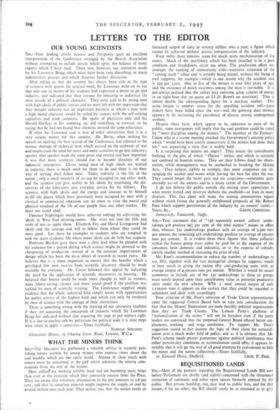OUR YOUNG SCIENTISTS
LETTERS TO THE EDITOR
SIR,—Your leading article Science and Prosperity gave an excellent interpretation of the Conference arranged by the British Association without attempting to include details which upset the balance of many reports which I have read. There was, however, one statement made by Sir Lawrence Bragg which must have been very disturbing to many industrialists present and which deserves further discussion.
After telling us that the country has always been rich in the type of scientist with genius for original work, Sir Lawrence went on to say that only one in twenty of his students had expressed a desire to go into industry, and indicated that their reasons for objecting to industrial life were mainly of a political character. They were said to be young men with high ideals of public service and we were left with the impression that they thought industry was an unpleasant business in which a man with a high moral character would be soiled by contact with the self-seeking capitalists and trade unionists. He spoke of physicists only and Sir Harold Hartley, in his summing up, did something to reassure us by saying that he had not found that chemists showed the same reluctance.
If what Sir Lawrence said is true of other universities then it is a very serious matter for this country. Mr. Sevin, when making his speech on opening the first session of the Conference, had referred to the serious shortage of technical men which existed on the outbreak of war and emphasised the need for more and more scientists to go into industry ; speaker after speaker made the same point and several said how important it was that more scientists should rise to become directors of our industrial enterprises. Clever young men of high ideals are wanted in industry, there is much work for them to do and there is no finer way of serving their fellow men. Today industry is the life of the nation ; only a small minority of us can be occupied in any other work, and the scientist can give reality to his ideals by translating the dis- coveries of the laboratory into everyday service for his fellows. The scientist with high ideals and the energy and courage to fit himself to fill the places which have previously been occupied by men with a classical or commercial education can do more to raise the moral and physical standard of the life of our people than any other worker. He must not stand aloof.
Florence Nightingale would have achieved nothing by cultivating her ideals in West End drawing-rooms. She went out into the filth and strife of war to apply them. Elizabeth Fry and David Livingstone had ideals and the courage and will to follow them where they could do most good. Let these be examples to students who are tempted to seek the quiet academic lift where many ideals can do little but stagnate.
Professor Blackett gave these men a clear lead when he pleaded with his audience for a period during which science might be devoted to the cheapening of production instead of to the constant improvement of design which has been the main object of research in recent years. He believes that it is more important to ensure that the benefits which a privileged few now receive from scientific discovery should be made available for everyone. Mr. Carter followed this appeal by indicating the need for the application of scientific discoveries to housing. He believed that houses could be made more cheaply as well as warmer, more labour-saving, cleaner and more sound proof if the problem was tackled by men of scientific training. The Conference supplied ample evidence that the whole industrial field simply teems with opportunities for public service of the highest kind and which can only be rendered by men of science with the courage of their convictions. There is something wrong with the training of our university students if they are acquiring the conception of industry which Sir Lawrence Bragg has indicated without also acquiring the urge to put matters right. If it is due to careless talk by politicians for political ends it is time steps were taken to apply a corrective.—Yours faithfully,


























 Previous page
Previous page